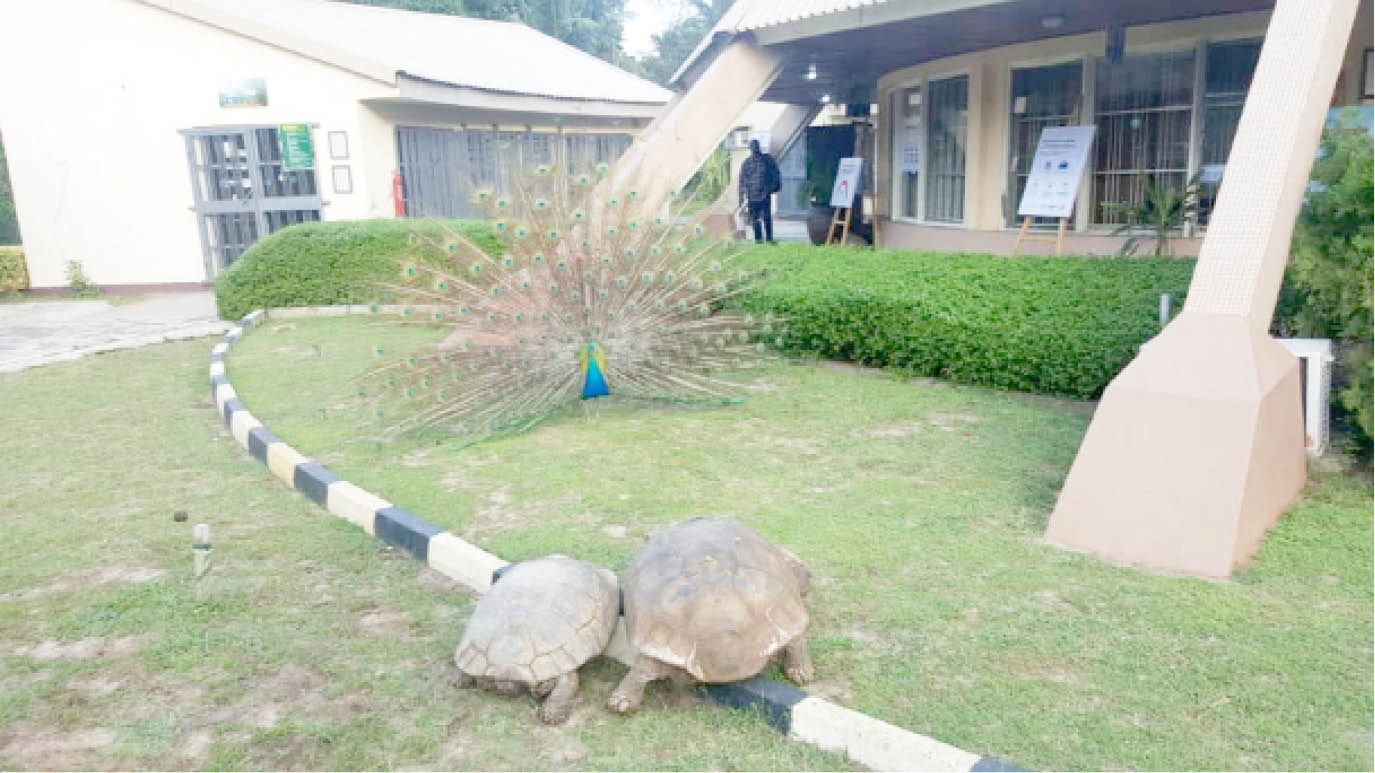Lagos, the sixth-largest city in the world by city population, is the smallest state in Nigeria by land mass – 3,345 square kilometre. Being a business-oriented and a fast-paced community, more than 500,000 people move to Lagos every year in search of greener pasture, thereby increasing the population of the state – which the Lagos Bureau of Statistics puts at 26 million.
Homes are being built on land reclaimed from the Atlantic Ocean among others for the urban rich while the majority poor live in slums, including the world’s biggest floating city in Makoko – a localised community built on stilts, across the 3rd Mainland Bridge located on the coast of mainland Lagos.
This huge population and urbanization of the state have destroyed suitable habitat for wildlife, reducing available habitat to sustain wildlife populations and fragmenting available habitat.

In order to address the extreme challenges to biodiversity and ecosystem services by city expansion, 78 hectares of Natural Resource Conservation was carved out in Lekki Peninsula, next to the Lekki Lagoon, and near the Lagos Lagoon.
The Lekki Conservation Centre (LCC) was established in 1990 to serve as biodiversity conservation icon and environment education centre. The facility was built by the Chevron Corporation for the Nigerian Conservation Foundation (NCF), as a reserved sanctuary for the rich flora and fauna of the Lekki Peninsula. The company has since provided annual funding for the management of the centre.
It is the only vibrant protected area in Lagos State and one of the very few vibrant tourist destinations of repute in Lagos and has thus been recognized as one of the notable sites and monuments of special interest and exceptional relevance by the Lagos State Government under the LISTED SITES for the preservation, protection and restoration of historical properties and cultural heritage in Lagos State and for connected purposes.
The centre has grown into one of Africa’s prominent and most-diverse urban Nature Parks due to its high species richness. It is located in the coastal environs covering an approximate land area of 78 hectares, extending from kilometre 19 along the Lagos-Epe Expressway and ends up a very close distance to the Atlantic Ocean near Okun Ibeju Village, Eti-Osa Local Government Area of Lagos State.

LCC can be accessed through the Lagos-Epe Expressway.
Visitors are ushered into the reserve by a boulevard of coconut trees which leads to a well laid out car and Visitors Park. There is a cone-shaped building which serves as the auditorium for lectures, conferences, and seminars. Tourists have the opportunity of seeing a rare collection of beautiful pictures of endangered species of animals and plants arranged in glass stands around the oval hall. Park rangers are available as guides into the reserve.
The centre, with its picturesque scene, is a haven away from the chaotic nature of the city of Lagos.
Wildlife such as birds, monkeys and turtles are free to roam as you walk around the facility, enjoying the bliss of nature.
It has been rightly described as an oasis of nature within the urban chaos of Lagos, and the 401-metre-long canopy walkway is a scenic attraction reputed to be the longest canopy walkway in Africa.
It is an engineering feat and an amazing suspended swinging bridge walkway through the mosaic of vegetation types characterizing the LCC Nature Park. It has the entry and exit portals connecting six towers; treating visitors to unique experience to explore the Nature Park and get a bird’s eye of the habitat types and sight the unique wildlife that inhabit the Lekki Conservation Centre.
If you are not afraid of heights, this unique walkway offers up picnic table views of the nearby tree house, the bird-hide, fish ponds, woodlands, swamp forest, the jungle gym and a savannah.

For the adventurous in mind, climbing the death-defying 21-metre-high tree platform known as the tree house will be fun. And if you successfully make it to the top of the tree house, then you have the advantage of a panoramic view of the reserve, visitor’s centre, picnic area and children’s playground among the trees and a bird hide overlooking a swamp which is home to crocodiles and monitor lizards.
The tree house is one of the most fascinating features one can ever come across in an ecotourism zone. The tree house, stylishly seated on a stout Dawadawa tree (Pakia biglobossa) rises above 25m. A well-protected ladder is ruggedly mounted behind the tree to enable nature enthusiasts reach the tree house to savour the panoramic view of the tree canopy. The rest stops, as the name implies, serve as rest points and picnic site for small groups of visitors.
Indeed, LCC offers a serene environment for a good jungle journey. The environment is clean and well demarcated. However, the lion is not the king in this jungle – in fact, there is none. The kings of the LCC jungle are the monkeys. They are everywhere and they make the centre enjoyable, especially if you are not afraid of monkeys. To ensure tourists are not ‘attacked’ by the monkeys, they are always warned not to go with food items during walk in the centre.
Other animals that add beauty to the park include peacock, bushbucks, crocodile and turtles – the oldest is said to be over 90 years old. These are the animals you readily see around the park.
Lekki Conservation Centre also provides visitors a chance to see some of Africa’s rarest birds with its unique walkway through the swamp forest. The bird hide enables avid bird watchers to snipe at unaware avifauna that wades through the pool overlooked by the hide or foraging within the vicinity.

Among the birds at the centre are Black Kite (Milvus migrans), Lizard Buzzard, Harrier Hawk, Grey Kestrel (Falco ardosiaceus), Red-Eyed Dove (Streptopelia semitorquata), Blue Spotted Wood-Dove (Turtur afer), Green Pigeon, Wood Land Kingfisher, Allied Hornbill, Piping Hornbill (Bycanistes fistulator), Common Bulbul (Pyanonotus barbatus), noted a review by hotel republic.
The project manager of the Lekki Conservation Centre, Mr. Adedamola Ogunsesan, in an interview with Daily Trust Saturday, said all the animals naturally inhabit the reserve. He disclosed that Prince Charles was one of those that laid the foundation of the centre.
“We do have (wild animals) and our animals are not fed. They are mostly the animals we met here. We have crocodiles, monkeys, siberian cats, antelopes, snakes and others. The fish pond was donated by the Lagos State Government; the peacock and tortoise were also donated. All other animals naturally live here,” he said.
He said that establishing a conservation area in an urban setting had some challenges – the first of which was making the community to know that “this is a place you cannot cut down the trees, hunt the fish or just take a walk-in.”
He added that as years went by, the challenges developed into conflict between the animals and humans because in 1990 when the centre was established, the area was not as developed as it is now.
“So, as the monkeys or the snakes moved around in the past, there were not many challenges,” he said.
Ogunsesan, however, emphasized that the axis has become highly populated and urbanized and that the past challenges which were hunting and trespassing have now led to human and animal conflict because the animals have limited environment and do not understand the difference between what used to be their natural habitat and the homes built by human around the conservation area.
“There has been flooding in recent time but thirty years ago, it was easier for the water to come to the reserve and also go out. Thirty years after, the same channels for easier flowing of water have been blocked by the community and land speculators and that has made managing the flood a big challenge.
“As a result of this, the most recent challenge we are facing is that some of our trees are dying because water no more flows in and out as it was before,” he said.
The project manager also narrated how some animals in the centre were targeted by poachers and residents in the past.
He said, “We are a bit lucky nowadays that we have not been having our antelopes being killed as it used to be in the past. There was a case where one of the artisans killed a crocodile and he was charged to court. He said he killed the animal because he thought it was bush meat.

“Well, we have overcome the challenge by educating the people.”
One of the visiting tourists, Emmanuel Stephen, told our correspondent that the centre has contributed to the ecological development of Lagos State.
“You would agree with me that with N1000, you can have access to this place. It is one of the cheapest places in terms of entry fee. I prefer coming here to visiting the beaches.
“One of the things that forest does is filtering of dirt from the air that we breathe in, which is not so in an area where there is deforestation.
“So, if they have not preserved this place for over 30 years, we wouldn’t have been surviving with good oxygen in Lekki and its environs,” he noted.
Another visitor, Taiwo Ajadi, a graduate of Agricultural Engineering from the Lagos State Polytechnic (LASPOTECH) said he did visit Lekki Conservation Centre for research in some elective courses while he was in school.
Ajadi added that the centre helped him, especially in the areas that deal with the study of ecology.
“Students come here to practice what they have been taught in class. This place offers a unique opportunity to learn. LCC is not just a park for fun and relaxation, it is a resource centre,” he said.
As a resource centre, LCC is a model for the promotion of environmental education and public awareness of the natural world due to the rapidly increasing threats to the natural environment, the need to stem the alarming loss of the natural environment and the attendant potentially drastic consequences for the planet, as well as the concerns for the future conduct, welfare, happiness and survival of mankind on earth.
With LCC, the Nigerian Conservation Foundation (NCF) said it “intends to demonstrate that wildlife is integral to the ecosystems on which people rely for their survival and that we can ensure that the world’s wildlife has the space and resources it needs to thrive in harmony with people.”
It is important that the government and other stakeholders preserve the LCC from urban threat as the 22-staff strength centre has brought positive changes in ecotourism via preservation of vegetation, animals, and ecosystem service in the state.

 Join Daily Trust WhatsApp Community For Quick Access To News and Happenings Around You.
Join Daily Trust WhatsApp Community For Quick Access To News and Happenings Around You.


